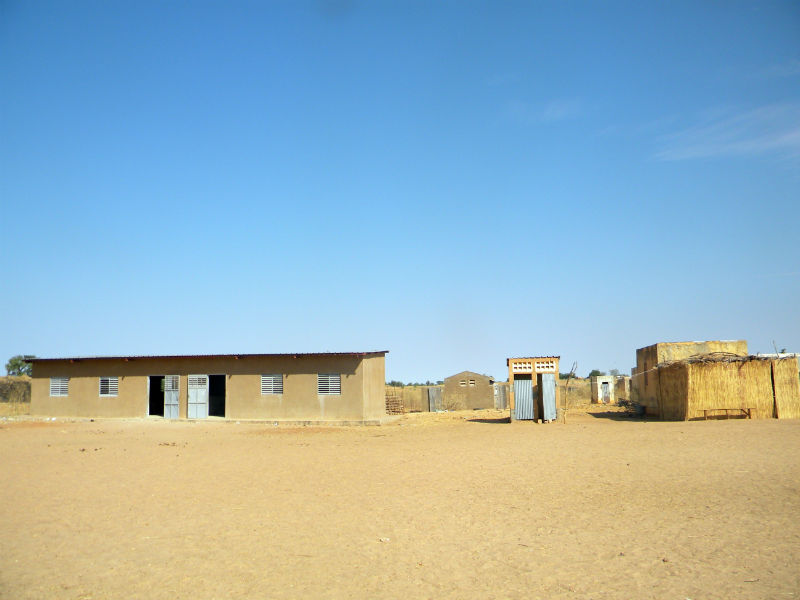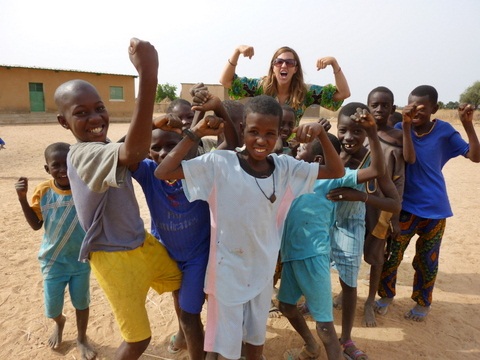Location
Diagaly, Louga Region, Senegal
Community Description
Diagaly is located 55 kilometers east of Linguere, just off the Route Nationale. Because it has a relatively large population of approximately 1,500, and is the home to the sole deep-bore well in the area, Diagaly serves as a hub and commercial center for numerous surrounding villages.
 The majority of residents of Diagaly are ethnically Pulaar, with a small Wolof population. Economic life is sustained primarily through herding and farming, in addition to mercantile subsistence. The villagers are constantly working to improve their living conditions. Numerous village committees have as their sole objective the improvement and development of the community, and they work consistently and diligently towards this end.
The majority of residents of Diagaly are ethnically Pulaar, with a small Wolof population. Economic life is sustained primarily through herding and farming, in addition to mercantile subsistence. The villagers are constantly working to improve their living conditions. Numerous village committees have as their sole objective the improvement and development of the community, and they work consistently and diligently towards this end.
In the heart of the village lies a 76-meter, deep-bore well and a large water storage facility. However, due to a lack of electricity and shortage of funds to run the generator to pump the water, the residents of Diagaly have learned to live with frequent and disruptive water shortages. On average, water is available only once a week and has occasionally been cut off for up to two weeks.
Towards the western-most point of the community lies a primary school with seven classrooms, teacher’s housing, and latrines for both teachers and students. The Diagaly Primary School has a total of six teachers with a student population of around 140. A water faucet exists within the school compound. However, as the availability of water is extremely sporadic throughout the entire village, the school has no reliable source of water for the students or teachers for drinking, hygiene, or sanitation.
Project Description
This project is to build a water storage facility and handwashing station at the Diagaly Primary School.
Two covered water storage containers will be built from large barrels. Cement will be used to line the barrels, and faucets will be installed.
 The containers will be raised off the ground by a platform constructed from cement and iron bars.
The containers will be raised off the ground by a platform constructed from cement and iron bars.
Project funds will be used for materials, including two barrels, covers, cement, iron bars, and spigots, and to pay labor fees.
All materials will be purchased in Linguere, the department capital, and transported to Diagaly for construction. Local mason Chierk Mbow will be responsible for construction, including lining the barrels with cement and fastening the spigots onto the bottom of the barrels. He will also build the platform using cement and iron bars.
Two latrine kettles and a few bars of soap will be attached to the barrels, while the extra supplies will be stored in one of the classrooms for later use. The tanks will be decorated to make them more kid-friendly and informative for all users.
The handwashing station will be maintained by the teachers and school director. They will ensure that the barrels remain full of water, by utilizing the school water hose to refill the barrels on a regular basis.
Handwashing causeries will be provided for the entire student population, promoting the use of the handwashing station and emphasizing the importance of maintaining basic hygiene.
Project Impact
150 people will benefit from the project.
Peace Corps Volunteer Directing Project
Kimberly Hall
Comments
This project makes available water for drinking, cleaning latrines, and handwashing when water is otherwise unavailable.
Kimberly previously completed the Diagaly Women’s Garden Water Project – Senegal and the Mbowen Women’s Garden Water Project – Senegal.
Dollar Amount of Project
$325.00
Donations Collected to Date
$325.00
Dollar Amount Needed
$0.00 – This project has been fully funded through the generosity of The Soneva SLOW LIFE Trust as a part of their Clean Water Projects initiative.
We encourage others to continue to donate using the Donate button below, and we will notify Peace Corps Volunteer Kimberly Hall of your donation. Additional funds will be used to fund the next project by Kimberly and/or those of other PCVs in the country of service.
![]() This project has been finished. To read about the conclusion of the project, CLICK HERE.
This project has been finished. To read about the conclusion of the project, CLICK HERE.